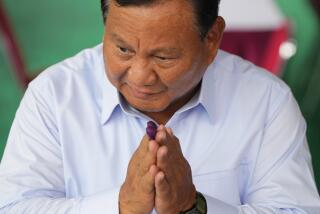Gen. Wiranto: From Brink of a Sacking to Strongman
- Share via
JAKARTA, Indonesia — Just a week after his authority was challenged and rumors spread that he would be sacked, Gen. Wiranto, the chief of the armed forces, has emerged as the most powerful man in Indonesia.
“Wiranto is the key playmaker and unmaker,” a Western diplomat said. Others agree, believing that he was largely responsible for engineering the deal that led to President Suharto’s resignation Thursday after 32 years in power.
The 51-year-old general, a former Suharto aide, further strengthened his hand Saturday by confirming that he had removed the unpopular Lt. Gen. Prabowo Soemitro Subianto as commander of elite special forces. Prabowo is separated from one of Suharto’s daughters.
“Getting rid of Prabowo was an important step toward reform, because there was so much speculation about his involvement with missing students and the shooting of the six students before the riots,” political scientist Mochtar Pabotinggi said.
Prabowo, 46, who attended the advanced officers training course at Ft. Bragg, N.C., in 1980 and wanted Wiranto’s job as defense chief, was widely believed to be behind some of Indonesia’s most flagrant human rights abuses. Among them are the disappearances of 14 student activists--five remain unaccounted for--and the supplying of provocateurs to encourage riots against ethnic Chinese merchants. He was often described as a sadist and a manic depressive.
The 465,000-member military has always played an important political role in Indonesia and was instrumental in bringing to power both Suharto in 1965 and his predecessor, Sukarno, in 1945. Seventy-five members of the military serve in the 500-seat parliament, and it is said that no Indonesian president can stay in power without the military’s backing.
Although the momentum for the three months of protests that led to Suharto’s resignation was supplied by students, the uprising could not have succeeded without the support of Wiranto, whom Suharto appointed to the top defense job only in February. He, diplomats said, was the one who forced Suharto’s hand--and, by being at once conciliatory to and stern with the student demonstrators, ensured that the hand-over of power to B. J. Habibie occurred without bloodshed.
Suharto’s regime began unraveling May 13, when, with the president in Cairo on an official trip, riot police shot six students in an unprovoked attack. The police were supposed to be armed with rubber bullets, not live ammunition, and some witnesses have been quoted as saying that the fatal shots were fired by sharpshooters using rifles with telescopic sights.
The 195,000-member police force also falls under Wiranto’s command, and Wiranto removed its men from the front lines and put his better-trained army on the streets. But the general’s tolerance of the student demonstrations led Suharto to consider firing him, Western diplomatic sources said, and raised fears that his forces might end up fighting Prabowo’s elite independent units.
Wiranto surprised everyone by telling a news conference that, contrary to what the police chief had said, the six students had been killed with live ammunition. He promised to investigate. He also pledged to find out who was behind the kidnapping of the 14 student activists.
There was speculation that if Wiranto’s troops had been called upon to carry out large-scale repression of protesters, their loyalty might have reached the breaking point. Wiranto made the decision to avoid a confrontation between the protesters and the soldiers, political analysts said.
When rioting followed the students’ deaths, Wiranto had two options, diplomats said: Move his soldiers in and kill a lot of people in securing Jakarta or let the riots run their course. He chose the latter.
Wiranto was the one who let the students demonstrate in the first place and allowed them--by not acting--to take over parliament, Western military experts said. He also persuaded protesters to call off a huge rally that could have ended in a bloody confrontation with the military and decided to evict students Saturday but to do it peacefully.
When he determined that the crisis could be ended only by Suharto’s resignation, Wiranto put together the group of former Suharto loyalists who, one by one, knocked on the old man’s door to tell him it was time to quit, Western intelligence sources said.
During negotiations with Suharto, Wiranto promised that the army would protect the former president and his six children.
More to Read
Sign up for Essential California
The most important California stories and recommendations in your inbox every morning.
You may occasionally receive promotional content from the Los Angeles Times.













